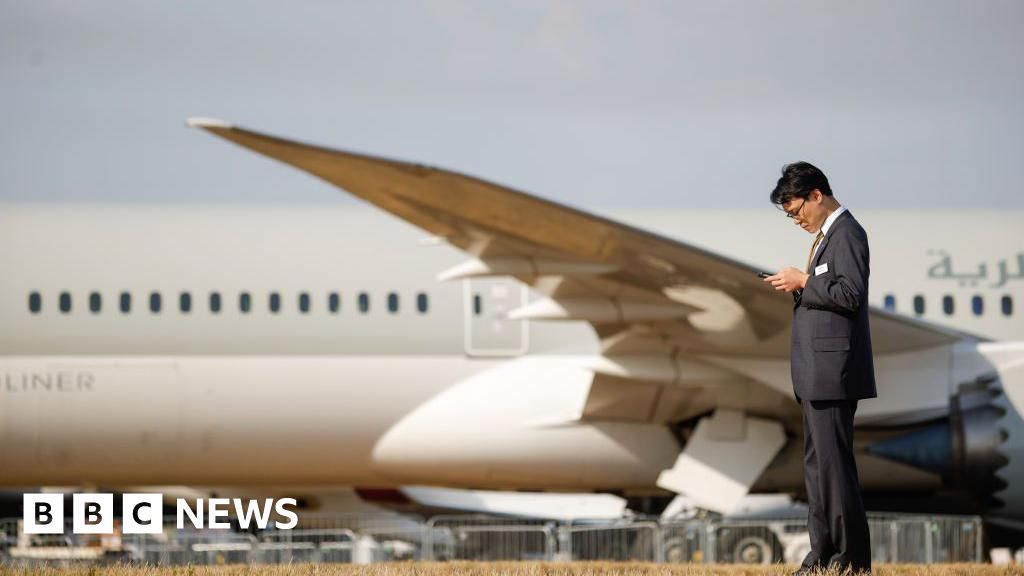ARTICLE AD BOX
Image source, Getty Images
Image caption,An anti-government protest in Colombo
Sri Lanka is set to see "a series of defaults" after it said it would suspend foreign debt interest payments, a leading credit rating agency says.
It comes as Moody's downgraded its assessment of bonds sold by Sri Lanka.
On Monday, the country's finance ministry confirmed that it would miss $78m (£60m) of debt interest payments.
This week, Sri Lankan officials started talks with the International Monetary Fund (IMF) as it faces its worst economic crisis in more than 70 years.
Negotiations with the organisation in Washington started positively, Shamir Zavahir, an aide to finance minister Ali Sabry, tweeted.
However, Mr Zavahir added that the IMF held the initial view that a request for an Rapid Financing Instrument (RFI), or emergency funding, "doesn't meet their criteria".
"In any event, IMF appears to be positive towards granting an Extended Fund Facility", Mr Zavahir added. "Ideally if this can be expedited, it can help stabilise things in the short term till long-term solutions kick in."
A RFI is usually granted to member nations with "urgent" funding needs, because of sharp commodity price rises, natural disasters or conflicts. It doesn't require countries to have a plan to improve their circumstances.
An Extended Fund Facility requires a country to make commitments with "a strong focus on structural reforms to address institutional or economic weaknesses".
Negotiations with IMF started on a positive note today.They see the recent steps taken to increase the interest rates and calling for RfP’s for the appointment of Intl. Financial/Legal Advisors as good first steps towards a possible restructuring Programme. FM made a
— Shamir Zavahir (@ShamirZavahir) April 19, 2022The BBC is not responsible for the content of external sites.View original tweet on Twitter
Last week, the Sri Lankan government said it would temporarily default on $35.5bn in foreign debt as the pandemic and the war in Ukraine made it "impossible" to make payments to overseas creditors.
If the overdue interest rate payments are not made within a 30-day grace period, it would mark the Sri Lanka's first default on its foreign debt since its independence from the UK in 1948.
The South Asian nation has seen mass protests in recent weeks as it suffers food shortages, soaring fuel prices and major power cuts as its reserves of foreign currencies are running low.
The latest rating from Moody's suggests that overseas bonds issued by Sri Lanka are "likely in, or very near default".
The rating agency said the country's move to stop some payments "will lead to a series of defaults with the first coupon payments for the government's international bonds coming due today, April 18, 2022." A coupon is the interest payment due on a bond.
Moody's added that the non-payment was "unlikely to be cured during the grace period", as a debt restructuring programme with the IMF "will take time".
Credit ratings are intended to help investors understand the level of risk they face when buying a financial instrument, in this case a country's debt - or sovereign bond.
On Monday, Sri Lanka's finance ministry confirmed that it would miss $78m in interest rate payments for international sovereign bonds.
A spokesperson told the BBC this was "in line with the government policy decision" to pause foreign payouts.
Asked if payment would be made within the 30-day grace period, the spokesperson said: "A decision in this regard will be published in due course".
International sovereign bonds make up the largest share of Sri Lanka's foreign debt.
They are held by countries including China, Japan and India as well as major investment firms such as BlackRock, UBS and Allianz.
Meanwhile, the Colombo Stock Exchange is scheduled to remain closed all this week, due to the "present situation in the country".
You may also be interested in:
South Asia Correspondent Rajini Vaidyanathan meets one family struggling to get fuel in Sri Lanka

 3 years ago
84
3 years ago
84








 English (US) ·
English (US) ·